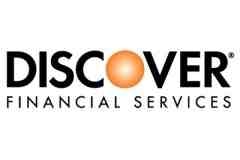Since its spinoff from Morgan Stanley in 2007, Discover Financial Services (NYSE:DFS) has done very well for its shareholders recently, having rebounded from its financial crisis low of $4.73 to its current level of just under $40. However, with slow growth expected over the next few years, should investors cash in and take their profits, or does the number four credit card issuer have an ace up its sleeve to boost profitability and shareholder value?
Discover Financial Services (Discover) is primarily known as a credit card issuer, but also banking services such as savings accounts, CD’s, and personal and student loans. Discover Financial Services (NYSE:DFS) operates through two segments, Direct Banking and Payment Processing, with Direct Banking accounting for the majority of revenue (95%).

Speaking of which, acquisitions and partnerships have been major parts of Discover’s growth strategy over the past few years. In addition to Diners Club, major acquisitions include the Student Loan Corporation in 2010, which gave Discover an established student loan platform as well as an established relationship with the schools.
About a year ago, Discover revealed its plans to shift its focus to direct banking, offering more traditional banking services to consumers. Its credit card network gives it a unique direct marketing opportunity for its other banking services, which I think will give the company an advantage in implementing new services. For example, Discover began its home loan business this past year, originating conventional and FHA mortgages. Through its credit portfolio, Discover should be able to produce quality leads to build and maintain a mortgage portfolio of high credit quality.
As far as partnerships go, I am very curious to see how the “mobile wallet” partnership between Discover and eBay Inc (NASDAQ:EBAY) plays out. The two companies announced a deal last August that would extend PayPal’s (owned by eBay Inc (NASDAQ:EBAY)) services to 7 million merchants on Discover’s payment network. This is absolutely huge. Think of how many people you know who use PayPal. All of those consumers will be able to use their PayPal accounts to make payments at retail stores that accept Discover cards starting in April of this year. In my opinion, this could make Discover’s Payment Processing segment a major profit source for the company. We’ll just have to wait and see how well it catches on…
Because of the relatively slow growth rate analysts are calling for, Discover trades at a seemingly low valuation of just 8.7 times earnings. I personally think that Discover stands more to gain from the PayPal deal than the market is anticipating, and I believe that earnings will grow accordingly. Discover has also proven to be a very shareholder-friendly company through buybacks. In fact, the number of outstanding shares has declined from 548.8 million in 2010 to 497.5 million currently, a reduction of 9.3% in just over two years.
As mentioned before, Discover is the number four credit card in the U.S., behind Visa, MasterCard, and American Express Company (NYSE:AXP). However, of these competitors, American Express is the only “fair” comparison, as Visa and MasterCard are not direct issuer of cards; instead, their cards are issued by other financial institutions. I would also like to briefly take a look at Capital One Financial Corp. (NYSE:COF), whose business model is very close to what Discover Financial Services (NYSE:DFS) wants to be when the expansion of their banking services is complete.
American Express Company (NYSE:AXP) issues both charge and credit cards to consumers and businesses worldwide, as well as providing travel expense services (like their famous Travelers Cheques). The two major differences between their business model and Discover’s is their international exposure and the absence of traditional banking services, like student loans and mortgages, which investors could see as a positive or negative. American Express Company (NYSE:AXP) currently trades at a relatively high 16.1 times earnings, however analysts project a 12% forward growth rate, which would justify the higher valuation if accurate.
Capital One Financial has the business makeup that Discover wants, which makes them perhaps the best comparison. Capital One has about $206 billion in loans, with about 40% of those in the form of credit card outstanding balances. They are actually very similarly valued to Discover at 8.5 times earnings.
While there are higher-growth (American Express Company (NYSE:AXP)) alternatives, and similar companies with established banking divisions (Capital One), Discover offers a cheap valuation and the potential for high reward if their mortgage division picks up and their PayPal partnership plays out. I’ll admit that the outcome of the PayPal deal is a bit uncertain (who knows how many of PayPal’s customers will get the Discover-issued cards linked to their accounts?), but if it catches on, Discover could benefit in an enormous way.
The article Low Valuation And High Potential originally appeared on Fool.com and is written by Matthew Frankel.
Copyright © 1995 – 2013 The Motley Fool, LLC. All rights reserved. The Motley Fool has a disclosure policy.





